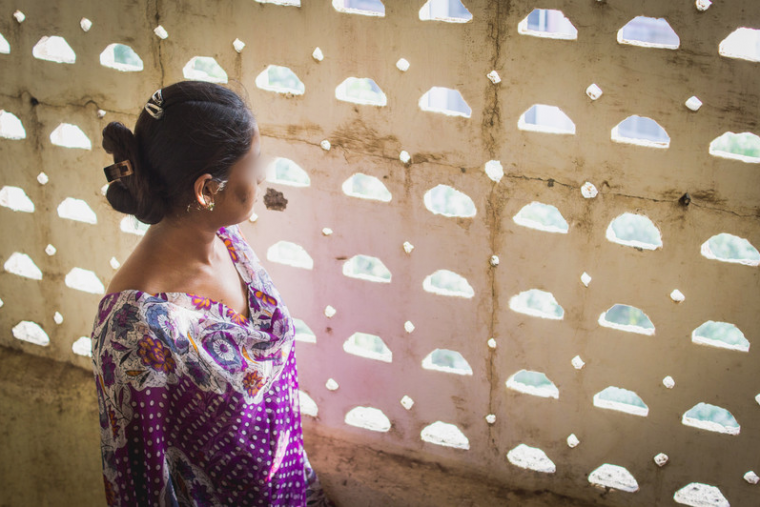4 things you didn't know about human trafficking today
Today is the World Day against Trafficking in Persons, designed to highlight scale of human trafficking for sex and forced labour. The chief executive of International Justice Mission offers four insights into the trade in human beings.

1. Trafficking is not a desperate choice made out of poverty
Twenty-year-old Amiyah [not her real name] just wanted to eat her pizza in peace. She saw two men out of the corner of her eye, but ignored them and closed her eyes to pray for the meal.
She blacked out. The men had drugged her water. When she awoke, terrified, she was in a brothel. As the youngest, she was forced to serve the most customers: 120-150 men a week.
The brothel was cramped and dirty, and none of the mattresses were ever washed. Electricity was unreliable, often leaving the 20 young women inside in total darkness. Windows were boarded up and every door was barred so no-one could escape.
Amiyah was in so much pain she could hardly stand when police and International Justice Mission Mumbai arrived at the brothel the night of the rescue operation.
Poverty makes people more vulnerable to traffickers – when you're struggling to feed yourself and your family you are more likely to be tricked by false offers of a good job and a better life – but the reality is that trafficking is a violent crime. It's not a choice.
Traffickers are experts in using lies, coercion, trickery and deception. They are criminals who steal people's lives using whatever means necessary. They promise a good job, an education, hope. And by the time people realise they have been tricked, it is already too late.
2. Trafficking is not just about forcing women into the sex trade
Twenty-nine per cent of trafficking victims globally are men and boys and – shockingly – children make up almost a third of all trafficked people.
While sex trafficking of women is a major global problem, trafficking doesn't have to be about sex – people can be trafficked for labour, for their organs, as soldiers, for begging, or marriage. Most victims of forced labour trafficking are men.
There is no one typical victim of trafficking, and no country where trafficking does not exist. It happens everywhere, including here in the UK.
Many of the everyday products we buy – everything from mobile phones, to roses, chocolate and coffee – can have trafficking or slavery in the supply chain. It's a hidden crime that touches all of us more than we would think. That's the sobering reality.
3. Trafficking is a bigger problem today than ever before
Human trafficking is the third largest crime worldwide. It's a multibillion-dollar industry that makes its money from buying and selling human beings.
Forty million people are in slavery today around the world – that's more people than at any other time in history. Many of them are victims of human trafficking. It's easy to forget that behind the statistics are real stories of real people living a daily nightmare.
Children like Foli. He was just a little boy when he was sold into slavery on a fishing boat on Lake Volta in Ghana. He and his friends were beaten, malnourished and sleep deprived as they worked from dawn til dusk. They faced a daily risk of drowning as they were forced to dive into the water to untangle nets caught on the branches below. Foli told IJM: 'Those children who can't swim, they die.'
When we partnered with police to rescue him, he told us his daily prayer: 'God, we are awake and we are going for fishing. Father Lord, as we are about to set this net, I pray that you protect and put your hands around it, that it does not go that deep that it would get stuck and they would ask me to go and untangle it.'
Thousands of boys and girls are in slavery on Lake Volta right now. Millions of people around the world are trapped in violent exploitation and praying for rescue as you read this.
4. Trafficking and slavery is more vast than ever but more stoppable than ever
The good news is that there is hope. It is possible to end slavery and trafficking in our lifetime.
Nelson Mandela once famously said: 'It always seems impossible until it's done.' Ending the transatlantic slave trade seemed impossible to William Wilberforce, until it was done.
When individuals, churches, governments, corporates and civil society choose to take action on trafficking it really does work.
In our own anti-slavery work, International Justice Mission has found that traffickers, brothel owners, pimps, and slave owners aren't especially courageous. When local police are equipped to do their jobs – rescue victims, gather evidence, and apprehend suspects – and when local courts prosecute and punish them, the crime can dry up quickly.
IJM has seen incredible progress in recent years. By training and partnering with local law enforcement in Cebu in the Philippines, IJM saw an incredible 79 per cent drop in the numbers of children in the commercial sex industry over a four -year period. Change is happening, and it's possible. But we all need to play our part.
Today is World Day Against Trafficking in Persons. So let's use today to say no more to trafficking. No more children bought and sold, no more women exploited in the sex trade, no more traffickers roaming free.
Let's be the generation that believes for what seems impossible: let's be the generation that ends trafficking and slavery in our lifetime. We know this is a fight we can win. Will you be a part of it?
David Westlake is chief executive of IJM UK.
Join the movement: ijmuk.org











